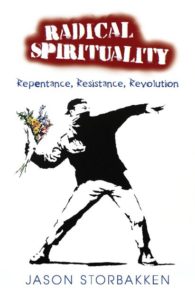Jason Storbakken is cofounder of the Radical Living Christian community in Brooklyn, New York, and Chapel Director of The Bowery Mission. Radical Living is a congregation within Atlantic Coast Conference of Mennonite Church USA. Jason’s first book, “Radical Spirituality: Repentance, Resistance, Revolution” (Orbis) is now available.
By Jason Storbakken
We are Anabaptists. We are Mennonites. We are distinct from other Protestants and denominations. We care about peace, justice, community. We are a unique and special people.
Many of us feel this way or at least I know, at times, I do. There is a special quality of Christianity that is evidenced in Anabaptism. Yes, we were persecuted by the Holy Catholic Church, but we were also persecuted by fellow Protestants. There is severity and deep conviction in our confession of faith.
Yet, in truth, too often we rest on the laurels of our Anabaptist forebears. We recall or express nostalgia for the countercultural, anti-empire sentiments and actions of those who came before us, all the while colluding with the current empire on many levels in our life. Some of us (even unwittingly) invest in stocks for pharmaceutical corporations and weapons manufacturers, thus endorsing a system that benefit from death and destruction.
Many persons and whole churches have substituted absolute pacifism with Just War Theory. In that regard we have embraced Augustinean Christianity to the detriment of Jesus’ command to love even our enemies who persecute and abuse us. We claim a Mennonite identity, but too often embrace an American identity or political ideology (whether left or right). We fail to recognize the radical calling upon our lives, which is to root ourselves in a Christ identity.
Some of us need a fresh baptism, a next baptism to awaken us to Christ’s calling upon our lives. We may have been baptized in water, but now we need a fire baptism to burn out the iniquity and inequality that pervades our lives. Like a prairie fire that burns the dead things and promotes richer soil, so too do we need the Spirit of fire to prepare us to live more deeply and richly.
A few years ago my wife and I and our two young children departed from our home in Brooklyn, New York, to travel more than halfway across country to South Dakota to visit the place where my Hutterite ancestors settled in this country in the 1870s. For many centuries my ancestors were Hutterites. My paternal great-great uncle led the Hutterites to this country and his younger brother, my great-great grandfather, Johann Feta (Father John) was the first of the Hutterites to experience the new birth.
After his born again experience he helped to found the Mennonite Brethren denomination with Jacob Wiebe, a Russian Mennonite reformer. I grew up hearing stories of persecution and sacrifice about our Anabaptist ancestors. The most recent story is that of my grandfather’s uncles who were tortured and martyred by the U.S. government in the prison at Fort Leavenworth because they resisted participation in the First World War. These stories shaped my early spiritual formation.
When we visited Hutterite colonies I was disheartened to learn that many of the Hutterites I met had moved far from their radical roots. All who we met were kind and generous and lived in deep community, but I was surprised upon visiting the schoolhouse to see art projects dedicated to the U.S. flag by lower school children. And while fellowshipping I learned that most of the adult Hutterites vote, which at one time may have been perceived as endorsement of a fallen system.
Whether or not one lives in a Christian intentional community, attends an Anabaptist church, or can trace their ancestry to early movement leaders, the aim should not be to find our primary identity in our religion, ancestry or any other thing, but in Christ.
It is important to visit and revisit stories and places to recognize the myriad ways that the Kingdom of God enters into this world, through individuals, families, communities, and movements. We do not need to live under tyranny and the threat of persecution to be faithful disciples of Christ. Yet it is important to remember the price paid by Christ and by all the witnesses who have suffered for the faith over the last two thousand years. These martyrs, these witnesses, point to the truth of the Gospel message. The blood of the Lamb reminds us of the cost of Christ’s conviction and moves us from a place of complacency to a place of devotion and active participation in the body of Christ.
Too often, as Christians, we forget those who came before us who lived sacrificially, who were true witnesses to a living faith. When we forget their stories, we become weak and numb and distracted. We suffer due to our forgetfulness and lack of mindfulness. It is often said that the church thrives in places where she is persecuted. It is in these places of pain and persecution where she most intimately remembers the Gospel story, and it is in these places where we are most inspired to live out even the most challenging of Jesus’ teachings.



